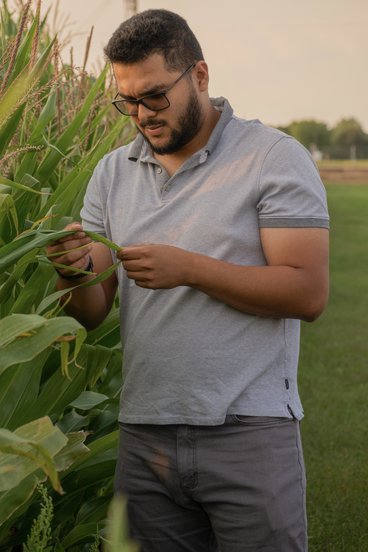
Can you tell us a little bit about yourself?
I am José E. Solórzano, currently a PhD student researching tar spot of corn, an emerging plant disease. I was born and raised in Danlí, El Paraíso, Honduras, a country in Central America. I grew up immersed in nature, cultivating the soil with multiple crops, and taking care of animals. Early in my life, I wanted to teach and through high school I obtained a degree certifying me to teach elementary school education. In 2014, I moved to Catacamas, Honduras, where I went to the Universidad Nacional de Agricultura y Ganaderia (UNAG) to obtain a bachelor’s degree in Agronomic Engineering. While deciding what to do for my graduate studies, in 2016 I attended a faculty-led study abroad at Texas Tech University to learn about animal production and food safety. In 2017, in my senior year at UNAG, I was awarded a visiting research scholar position at Louisiana State University (LSU) at the Doyle Mycology Lab to study fungal secondary metabolites. I graduated from UNAG in 2018, and returned to work at LSU at the Doyle Mycology Lab and in 2019 I started my master’s degree. I finished my master’s degree in 2021 and the same year started my PhD here at the University of Minnesota.
How did you get involved with plant pathology as a discipline?
During my childhood, I always encountered plant diseases that I wanted to understand in detail. I had access to empirical information but I also wanted to gain scientific knowledge. My first experience with plant pathology as a discipline was in 2015 when I took a plant pathology course which made me gain interest in fungi. At that time, plant pathology was not my final path to take since by then I had learned about animal production, which I was also considering for my future. In 2017, I participated in a study abroad led by UNAG and LSU faculty in Honduras. During that time, I met professors that encouraged me to apply for a visiting research scholar position at LSU. While at LSU, I was introduced to plant pathology through mycology and that is when I decided to continue my path into the discipline of plant pathology.
Tell me about a specific moment in your life that made you decide to pursue a career in Plant Pathology?
I decided to pursue a career in plant pathology when I was a visiting scholar at LSU in the Department of Plant Pathology and Crop Physiology. I was working with plant pathogenic fungi, and I felt challenged and intrigued by the research I was doing. Aside from that, being involved in research made me think about its impact on the world. That is one of the moments that made me want to pursue a career in plant pathology.
What has been the most rewarding moment of your career so far, and what led to that moment?
Obtaining my master’s degree from LSU. Multiple pieces were fundamental to this achievement but simplified they are multiple methodologies, a constant adaptation to the diverse field of science, and an understanding of multidisciplinary processes.
What do you enjoy most about the department of plant pathology?
It is a welcoming and supportive department. I personally enjoy being surrounded by such talented people with different backgrounds and at the same time being able to have interesting conversations.
Can you describe how being part of this department has helped your mission as a scientist?
Coming to this department has propelled my mission as a scientist. My advisor, the staff, and all the students have been supportive. They all encourage me and have helped me in many ways that either directly or indirectly have and continue to influence my mission as a scientist.
Can you tell us about your plans for the future?
I would like to become an educator and scientist with a desire for continuous learning, and the ability to explain and develop ideas to understand events that impact the health of organisms. I want to translate science into knowledge for people regardless of their background and status.
